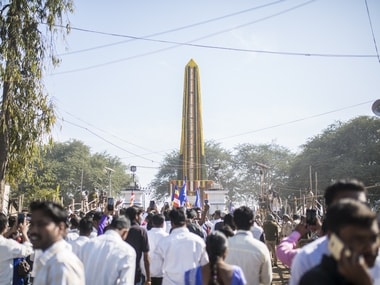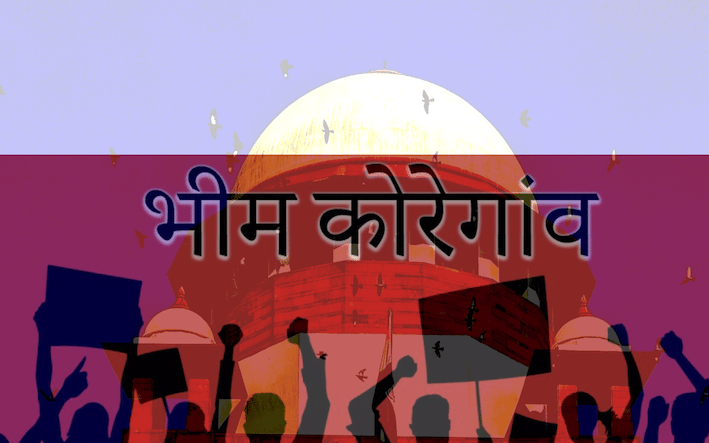The sarpanch of Bhima Koregaon did not deny the conspiracy behind the violence on 1 January, 2018, which many believe was a pre-planned attack on Dalit pilgrims by upper caste mobs. Sangita Kamble, the sarpanch, was responding to the question about the fraudulent letter typed on the village letterhead for the taluka police station of Shikrapur ahead of the occasion. She claimed to have no experience then, having just taken over.
Every year, on 1 January, tens of thousands of Dalits across Maharashtra gather at the war memorial of Bhima Koregaon — 40 kilometres from Pune. It commemorates the historic victory of the British army, which had a significant Dalit contingent, over the Peshwas. 2018 was the 200th anniversary of the battle. Therefore, it was an even larger crowd, which was allegedly assaulted by right-wing groups.
On 30 December, 2017, the Bhima Koregaon Gram Panchayat, on its letterhead, submitted a letter to Shikrapur police station, which read, “To avoid law and order situation because of what happened at Sambhaji Maharaj’s memorial in Vadhu, the Gram Panchayat and the entire village has decided to observe a bandh on 1 January, 2018. We request you to take the appropriate decision and cooperate with us.”
The letter had signatures of Kamble and the clerk, Sagar Gawhane.

The Bhima Koregaon war memorial. Image Courtesy: Shrirang Swarge
About four kilometres from Bhima Koregaon, the village of Vadhu had been gripped with caste tensions over a historical dispute in the last week of December last year. Vadhu has a memorial of Shivaji’s son, Sambhaji. Credible historical accounts suggest that he was cremated by a Dalit man called Govind Gaikwad after Aurangzeb killed him. On 29 December, Gaikwad’s statue, which stands right across Sambhaji’s memorial, was vandalised, triggering caste animosities. The Pune rural police had taken cognisance of the developments.
“The call to observe a bandh in Bhima Koregaon despite fears that law and order situation might deteriorate was odd, when Vadhu itself had not called for a bandh on 1 January,” said Rahul Dambale, activist with the Republican Morcha, based in Pune.
On 4 October, 2018, the tricky nature of the bandh in Bhima Koregaon came to light after Firstpost reported the testimony of the clerk to the inquiry commission appointed by the state to investigate the violence. He testified that the letter was backdated, and the village was not consulted as it claims.
In his affidavit, Gawhane, said he typed the letter because Ganesh Phadtare, an infamous Maratha leader and also a former deputy Sarpanch of Bhima Koregaon, asked him to do so. “On the morning of 31 December, Phadtare called and asked me to come to the Gram Panchayat office urgently,” the affidavit reads. “When I reached the office, Phadtare and his karyakartas were already there. He asked me to type a letter that called for the bandh in the village.”
A year later, Kamble did not deny the claims of the clerk when this reporter met her at the gram panchayat office in Bhima Koregaon. “I had just been elected as a Sarpanch on 19 December, 2017 to be accurate,” she apologetically said. “I had no experience. I am not even educated.”
Gawhane’s testimony even states that Phadtare called the Village Development Officer, Rajendra Satras, after he resisted typing up the misleading letter. Satras told Gawhane to do ‘what Phadtare said’. He typed the letter with Phadtare named as the initiator, and one Yogesh Gawhane as the endorser.
Yogesh, however, was not in the village at the time. When Gawhane pointed it out to Phadtare, he said, “It is none of your business.” Phadtare further asked him to mark the letter with the previous date because 31 December was a Sunday. “No such decision to shut the village was taken on 30 December by the Gram Panchayat or the villagers,” Gawhane’s afiidavit reads. “Gram Panchayat’s proceeding book also has no note of it.”
Kamble did not answer how she ended up signing the letter. “Please understand that my situation is vulnerable,” she said. “I sell vegetables to make my ends meet. My husband works as a driver. The village made me Sarpanch, and it is an honour for me to be given the chance to serve people.”
Bhima Koregaon gram panchayat is reserved for Schedule Caste. However, whispers on the ground say the sarpanch works under tremendous pressures from the influential upper caste men in the village, and it is highly likely that Kamble signed the letter in duress.
Shops and eateries in the village were shut on the day of the bandh because it would have caused inconvenience to the pilgrims who had travelled to mark the bicentenary on 1 January. Victims of the riots claim that was the precise idea of the bandh: cause inconvenience if Dalits obeyed, or more likely, wreck havoc if they resisted. Victims of the 2018 violence have consistently asked how did so many stones turn up in the area where the pilgrims had gathered.
Another resident of Bhima Koregaon, Mangal Kamble, in her affidavit, has said she had no clue about the bandh, corroborating Sagar’s claim of no unilateral decision or a meeting with villagers to keep the village shut due to frictions in Vadhu.
Mangal’s testimony to the inquiry commission explains how her eatery was burnt because she made arrangements of tea, snacks and lunch for those who had travelled to be part of the gathering. “On 31 December, 2017, my son Ram was decorating the premises in front of our shop. At 11.30 pm, member of Gram Sabha, Ganesh Phadtare arrived with two others,” she has written, “They said we have called for a bandh. Take down the decorations you have put up to welcome ‘your people’ and keep your shop closed tomorrow. My son declined to obey the orders and continued to work. Phadtare abused and threatened us that night. The next morning, when the visitors were having tea and snacks, a mob of 20 barged in and started beating us up, in which I was severely injured. My guests were forced to leave. The shop and the mandap we had installed were also destroyed. I was taken to a hospital in Hadapsar for primary treatment. On 2 January, when I came back to pay the person who had made decoration arrangements, a mob of 2,000 vandalised and burnt our house and shop at 11 am. We incurred losses of around Rs five lakh.”
Victims asked why the police have found it so difficult to find out on whose behest Phadtare had been conspiring. The Pune rural police have arrested over 100 people, acting on 23 FIRs, but because of the failure of the police to file the charge sheet even after a year, most of them are out on bail roaming around in the village. Including Phadtare, who, after being released was arrested again for half murder, and got bail for that too.
As preventive measure ahead of the procession on 1 January 2019, Phadtare had been asked to leave the village, and not come back until the rally concludes. He is currently in Goa, and is likely to return on January 5.
Lakhan Kamble, Mangal’s son, said the police have failed the victims, because they do not feel safe in Bhima Koregaon. “The police agreed to lodge our FIR in November, 11 months after the violence,” he said. “That too after activists pressured them. We have named Phadtare in our statements and affidavits, and he knows it. We could be in trouble once he gets back.”

January 3, 2019 at 3:59 pm
The suspicion has been raised by activists since many months after the violence in the area